| By Bob Weaver 2004

The late Carl Jarvis (left) of Meadow Run was a co-partner in the
Orma Theater which sprung to existence during the Great Depression.
Jarvis, now deceased, was married to the late Margaret Metheney who died in 1996, and is the father of Randy Jarvis of Parkersburg, Anita West of Grantsville and Beverly Harold of Chloe.
"They came out of the hollers on foot, ridin' horses and Model Ts," said Carl Jarvis, to see a movie show at the Orma Theater in the 1930s. Jarvis of Minnora, now 90, was a partner with Orma garage owner Holly Stump in the business venture.
Otis Conley erected the building for the movie house, next to Stump's auto repair business. "We went over in Ohio and bought the 35mm projector which took a 900 watt bulb," said Jarvis. There was a small problem. The West Fork didn't have electric service, so the movie house used a generator to run the projector.
During the early days of country music radio, West Virginia stations like WWVA (Wheeling), WMMN (Fairmont) and WCHS (Charleston) helped with the careers of Grandpa Jones, Bill Carlisle and T. Texas Tyler. They, and many others, came to perform on the Orma Theater stage.
"Grandpa came to Orma when he was in his 20s," said Jarvis. "He was a real common kind of guy, who just sat around and talked before he went on stage. Jones (1914-1998) started his grandpa act before he was 20 years old and went on to become one of America's best known country music performers.
Bill Carlisle passed away at age 98, a member of the Country Music Hall of Fame and T. Texas Tyler (1916-1972) was known for his war tribute "Deck of Cards."
"Calhoun loved them," said Jarvis, first hearing them on their battery operated radios. "The depression was a rough time for country entertainers," said Jarvis, often requiring them to stay overnight in people's houses and share a meal.
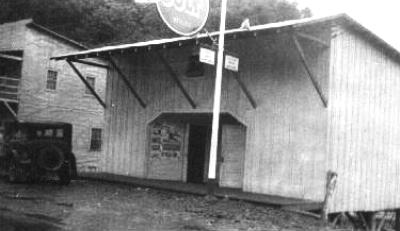
The old Orma Theatre stood along Rt. 16,
playbills posted to the left of the ticket booth
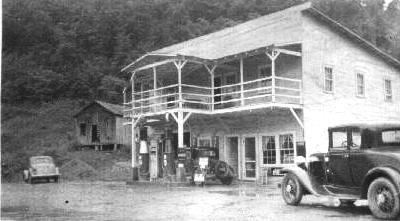 The movie house stood next to Stump's Auto Repair,
a building which is still standing
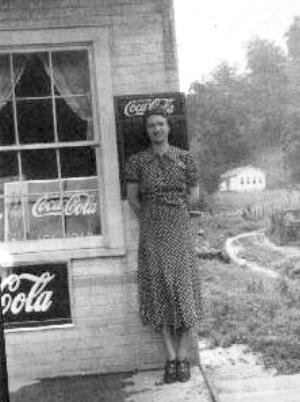 West Fork lady leaning against Orma garage
with old school in background to right
West Fork people liked western movies the best, said Jarvis. "We tried to show some other stuff, but that's what they came out to see."
The movie house would often fill up on Saturday night, during the Great Depression, but "We had a hard time making it in the movie business," he said. The movie house closed, but Carrie Conley, wife of Otis, later reopened it for a time with the help of her son Gary.
Flash forward twenty years and the long vacant movie house had a short resurrection in the summer of 1957. Ronzel Lynch, son of Russell and Madaline Stutler Lynch, joined with me for the movie house's last hurrah.
Carrie Conley, by then a widow, allowed us to fire up the projectors, showing movies on Friday and Saturday night. We borrowed two 16mm projectors, hung a sheet on the stage and dusted off the old wooden seats.

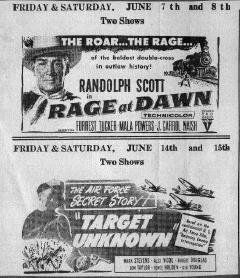
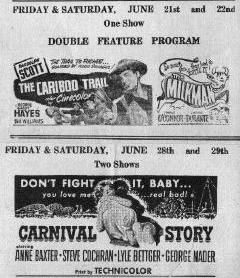
Movie bill for Orma Theatre resurrected in 1957, the last hurrah
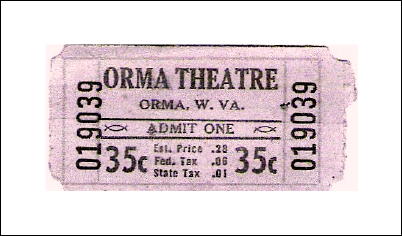
A ticket stub from the theatre (courtesy of Ann Newell of Chloe)
Ronzel recalled a young man walking out of Nicut who announced he had never been to the movies, although he had seen a TV.
Some Calhoun people had yet to travel out of the county, reminding me of a comment made by Rev. Glendon McKee who was speaking of his roots deep in a Calhoun holler: "I never expected to be further away from home as I could see in either direction."
We let the guy in free.
Western movies were still popular, but we showed a few old vampire and werewolf flicks which folks seemed to enjoy. In the tradition of the Saturday serial, we started showing the first of 15-chapters of "Secrets of Treasure Island," oblivious that the summer would be over before it could be concluded.
Ronzel and I concurred with the theater's earlier entrepreneur Carl Jarvis, "It was a hard way to make a living, but it was a lot of fun."
We continued our movie-showin' career in churches and country stores through the 50's before graduating from Calhoun High, with travel films and religious movies, like the silent version of "King of Kings."
While movies are still an important form of entertainment today, they are focused mostly on the young audience. They are no longer a novelty, or enjoy the status of entire families going out to the movies.
Grantsville had the longest running movie house, the Kanawha Theater, spanning from 1919 to 1952, from the silent movie days to the talkies.
Arnoldsburg, for a brief period of time, likely in the late 1930s to early 1940s, had its own movie picture show.
| 


